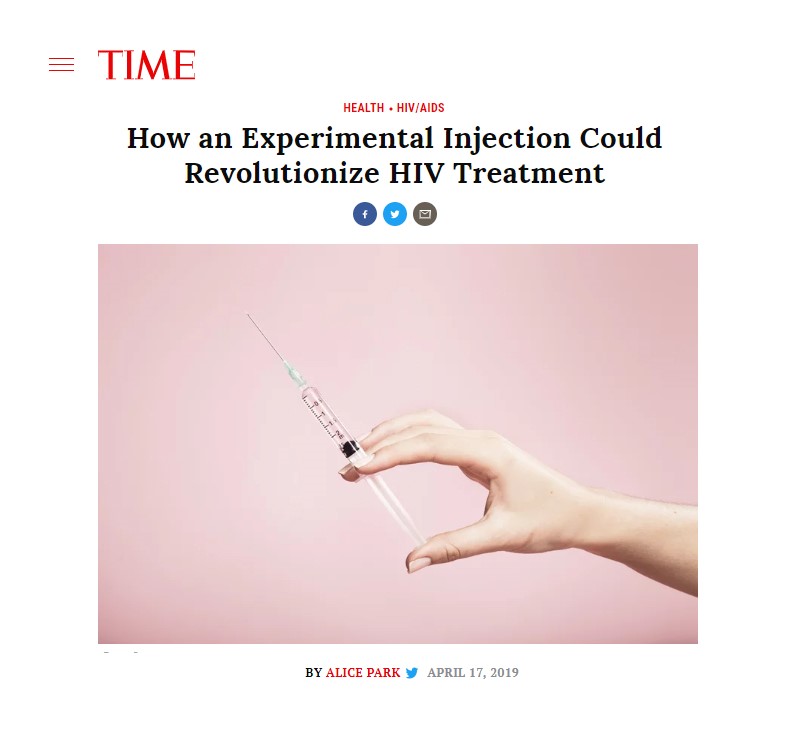
HIV treatment has come a long way since the early days of the epidemic. Patients can now take various combinations of dozens of medications keep the virus under control and halt their disease from decimating their immune systems and leading to more serious, often fatal outcomes.
But harnessing HIV requires daily vigilance. Missing doses of the pills can give the virus the chance to develop resistance to the drugs and lead to a surge in new copies of HIV that flood the body.
In a new study published in the New England Journal of Medicine, researchers at Taiwan-based United BioPharma report encouraging results with a single injection that seems to stymie HIV as well as daily pill regimens. The results add to a growing number of studies suggesting that patients may be able to take pill holidays without putting their health at risk.
In the study, 29 people who were diagnosed with HIV and received anti-HIV treatment in pill form for a little more than five years on average were randomly assigned to receive one of two doses of an injectable antibody called UB-421. It’s designed to stick to the same site on immune cells that HIV uses to infect cells; the idea is that UB-421 would compete with HIV and occupy more of these sites, preventing the virus from entering and infecting new cells. In fact, UB-421 binds to immune cells with 50 to 100 times greater affinity than HIV does and can even knock HIV out of the entry site when the virus is already there.
All of the volunteers received eight injections; one group received the shot once a week, while the other received it once every two weeks at a higher dose. During the eight-to-16 week study period, all of the people kept their virus to below-detectable levels, indicating that the injections — in both doses and frequencies — were effectively controlling HIV from replicating further and spreading infection.
“We were able to use this antibody to maintain durable viral remission using a single agent instead of a cocktail of drugs,” says Chang-Yi Wang, chief scientific officer and chairperson of the company and lead author of the study. “Such a durable maintenance is unprecedented, and it opens up a host of potential new treatment options for patients with resistance-prone HIV infection.”
The study is a first step toward making it possible for patients to move away from daily pill treatments and rely on longer term control of the virus. The researchers plan to study UB-421 next in people who have been recently diagnosed with HIV but are not yet taking medications; they will see if the shot can control the virus for up to six months.
Wang is hopeful that the results will be positive. Already, further analysis of the data from the current study suggest that longer remissions may be feasible. Not only did the antibody UB-421 block HIV from infecting new cells, but it also seemed to modify the study participants’ immune cells in ways that made them better able to fight off the virus. UB-421 seemed to activate certain immune cells to better recognize and destroy HIV, including the hard-to-reach reservoirs where the virus tends to hide from immune cells. “We think [UB-421] could be a great agent in future studies for activating T cells to do many things, including cleaning the body of virus,” she says.
If the immune system can be retrained to better ward off HIV, that could lead to longer and longer periods of pill-free treatment and even eventually, perhaps, to what experts call a functional cure for HIV — should UB-421 allow patients go years with undetectable HIV levels without needing pills or repeated antibody injections.
“We don’t know exactly what passively transferring antibodies is doing,” says Dr. Anthony Fauci, director of the National Institute on Allergy and Infectious Diseases, which partially supported the study. “But there is something going on to induce at least partially — not perfectly — better immune responses than the body naturally makes against the virus.”
Fauci notes that UB-421 works by mimicking the door on immune cells that HIV uses to enter and infect. Fauci and other researchers are also studying antibodies, called broadly neutralizing antibodies, that bind to HIV itself and prevent it from infecting cells. It’s likely that an effective, long-acting and pill-free treatment for HIV may involve a combination of agents like UB-421 and broadly neutralizing antibodies, says Fauci, so that HIV is both crippled and prevented from entering cells. “Something like that could be a knock-out punch,” he says.
(Original article: How an Experimental Injection Could Revolutionize HIV Treatment)
